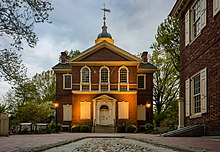
Back Asociación Continental Spanish Association continentale French Continental Association Italian 同盟規約 Japanese Континентальная ассоциация Russian

The Continental Association, also known as the Articles of Association or simply the Association, was an agreement among the American colonies adopted by the First Continental Congress in Philadelphia on October 20, 1774. It was a result of the escalating American Revolution and called for a trade boycott against British merchants by the colonies. Congress hoped that placing economic sanctions on British imports and exports would pressure Parliament into addressing the colonies' grievances, especially repealing the Intolerable Acts, which were strongly opposed by the colonies.[1]
The Congress adopted a "non-importation, non-consumption, non-exportation" agreement as a peaceful means of settling the colonies' disputes with Great Britain. The agreement, which had been suggested by Virginia delegate Richard Henry Lee[2] based on the 1769 Virginia Association initiated by George Washington and written by George Mason, opened with a pledge of loyalty to King George III of Britain, and went on to outline a series of actions opening with a ban on British imports that would begin December 1, 1774. Trade between the colonies and Britain subsequently fell sharply. The British soon responded with the New England Restraining Act which escalated their own economic sanctions. The outbreak of the American Revolutionary War in April 1775 superseded the need to boycott British goods.
A significant effect of the agreement was that it exhibited the colonies' collective will to act together in their common interests. Abraham Lincoln, in his first inaugural address in 1861, credited the origin of the union which would become the United States to the adoption of the Continental Association. The Union actually may have begun slightly earlier with the First Continental Congress's opening session on September 5, 1774, and from that date on, the colonies acted in accord on a series of agreements leading up to the Congress's closing session seven weeks later.[3] One of the last of these agreements, the most visible symbol of political unity among the colonies up to that time, was the adoption of the Continental Association.[4]
- ^ Mary Beth Norton, 1774: The Long Year of Revolution (2021) pp 199–202.
- ^ Encyclopedia.com page
- ^ Nettels, Curtis Putnam (1957). "The Origins of the Union and of the States". Proceedings of the Massachusetts Historical Society. 72: 68–83. JSTOR 25080515. Retrieved February 6, 2022.
- ^ Carl G. Karsch. "The First Continental Congress: A Dangerous Journey Begins". Carpenter's Hall. Retrieved January 9, 2022.
